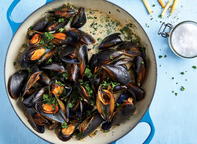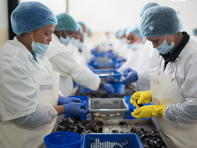Mussel products from South Africa include whole live mussels, half-shell mussels, mussel meat and a variety of processed mussels such as crumbed mussels. Live mussels can be stored for up to four days in a fridge if covered with a damp cloth, not water or ice.

Farmed mussels do not contain sand like their wild brothers, but their beards need to be removed before cooking. Pull to the wider part of the shell, pinch and pull. To freeze, steam the live mussels first and then freeze.
Mussel meat can vary in colour, depending on the species. The Mediterranean mussel can be orange (female) or white (male) in colour, but the indigenous South African black mussel can be black or blue. There is no difference in quality and both taste the same.
Fresh mussels are packaged in 5 kg plastic net bags and frozen half-shell mussels are packed in plastic net bags of 800 g each. Bulk mussel packs contain 12 net bags.
South African consumers prefer larger mussels compared to European consumers who like smalle mussels.
Countries importing South African mussels include Namibia (50%), Mauritius (20%), Zambia (7%), Zimbabwe (3%) and other African countries.
Health Benefits of Mussels

Mussels are nutritious, healthy and an economically priced source of protein (24%), similar in protein content to beef, but 25% lower in calories. Mussels are low in fat but high in omega-3 fatty acid and especially high in vitamin B-12, selenium and manganese. It also contains potassium, folate, iron, zinc and vitamin C.
Farmed mussels - grown on ropes from rafts or longlines suspended in seawater - have a carbon footprint of 600 g of carbon dioxide per kilogram of mussel meat produced, much lower than farmed salmon with a carbon footprint of 11 600 g/kg meat or beef with over 30 kg/kg meat.
Mussel Shell Use
Of the total volume of shellfish produced, between 75 and 90% consists of shells, mostly composed of calcium carbonate. Mussel shells are usually discarded, but studies in 2012 by the University of Santa Catalina in Brazil, have found that mussel shells can be used to extract calcium carbonate.
Calcium carbonate is used as a filler in polymers, as an additive to soil, as an alternative liming material to restore chemical and microbial properties and as a calcium supplement for humans.
In Korea, about 300 000 tonnes of mussel shells are produced yearly, a considerable threat to human health in terms of smell and environmental damage. Improper disposal of mussel waste (into water) can decrease water oxygen and microalgae and in turn, retard the growth of mussels. Concerned about the impact on human health, the Korean government financed a project to increase recycling of mussel shells.
A study in Malaysia has shown that seashell waste can be used in levels of up to 20% to replace concrete in certain building applications.
By Marinda Louw
For bulk or export enquiries please use the enquiry link below.